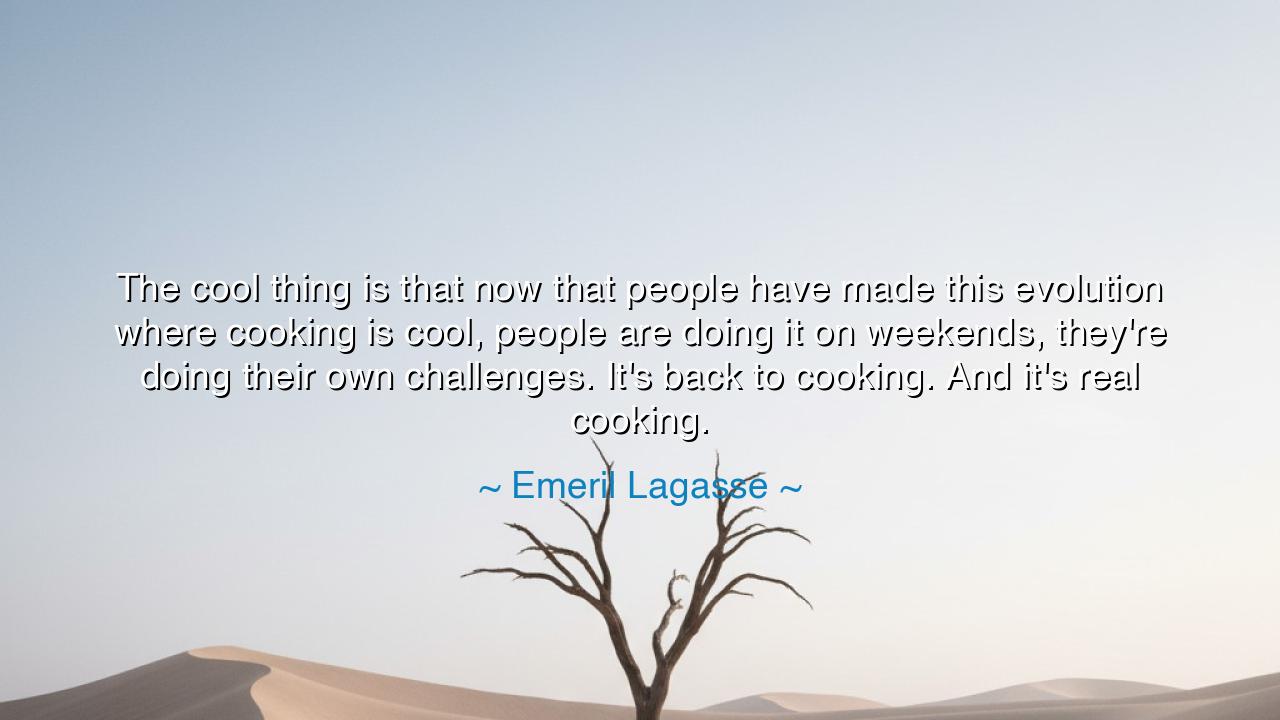
The cool thing is that now that people have made this evolution
The cool thing is that now that people have made this evolution where cooking is cool, people are doing it on weekends, they're doing their own challenges. It's back to cooking. And it's real cooking.






"The cool thing is that now that people have made this evolution where cooking is cool, people are doing it on weekends, they're doing their own challenges. It's back to cooking. And it's real cooking." These words from Emeril Lagasse capture a profound shift in how we view cooking and its role in our lives. For years, cooking was seen as a chore, a necessity, but rarely something that could be celebrated or enjoyed. In recent times, however, there has been a revival of cooking as both an art form and a communal activity, where individuals embrace the joy and creativity of preparing meals for themselves and others. Cooking has become not just about nourishment, but about expression, tradition, and a sense of connection to the past.
In the ancient world, cooking was not merely a daily necessity but a revered practice. The Greeks, for instance, viewed food as a celebration of life, and banquets were an essential part of their culture. In ancient Greece, philosophers like Plato would gather with friends for long symposia, where they would discuss politics, philosophy, and ideas, all while enjoying elaborate meals. These gatherings celebrated the idea that cooking was a ritualistic art, blending nourishment with community and intellectual exchange. The Greeks believed that the act of preparing food, and sharing it in community, could be a source of great joy and learning—a sentiment that resonates with Lagasse’s celebration of how cooking has become once again something cool.
Similarly, the Romans placed great emphasis on the feast. Their culinary practices were both a reflection of their societal values and a means of displaying their affluence and power. The Romans saw cooking not only as an art but as an opportunity to bring people together—to bond over shared meals. Cicero, the great Roman orator, spoke often of the importance of hospitality and gathering over meals as a means of strengthening both social ties and political alliances. The act of cooking and sharing food was both a communal and personal ritual that elevated the spirit and created an enduring connection between individuals.
In today’s world, as Lagasse points out, cooking has experienced a rebirth—a return to authenticity and craftsmanship. We see individuals experimenting with new recipes, hosting weekend challenges, and embracing the art of cooking as a personal expression. This movement is a departure from the pre-packaged and processed meals that dominated the latter half of the 20th century. Cooking is no longer just about convenience, but about reclaiming the kitchen as a space for creativity and authenticity. Lagasse’s observation speaks to a larger cultural shift where people are reconnecting with their food—taking pride in the process of cooking and the communal rituals that come with it.
This shift in how we view cooking is also a return to tradition—a tradition that is not only nourishing but deeply spiritual. In many cultures around the world, the act of preparing and sharing food is central to family and community life. In Japan, for example, the art of preparing a meal is seen as a sacred act, with each dish carefully crafted to reflect the seasons and the natural world. The Japanese tea ceremony is a perfect example of this reverence for food, where the preparation and consumption of tea becomes a meditative practice that encourages mindfulness and connection. In this way, cooking is not just about the ingredients, but about the intent behind the meal and the bonds it creates.
In the Western world, this revival of cooking also ties into the growing movement toward sustainability and local sourcing. People are becoming more aware of the environmental impact of their food choices and are returning to traditional methods of cooking that prioritize fresh, seasonal ingredients over mass-produced products. By embracing the art of cooking, individuals are not only learning how to nourish their bodies but also how to honor the earth and its cycles. Lagasse’s words reflect a growing recognition that cooking is more than just a means to an end; it is a way of expressing our values, whether they be related to health, culture, or sustainability.
The lesson from Lagasse's words is profound: cooking is a transformative act that transcends the mere preparation of food. It is about creativity, tradition, and community—about returning to something authentic and meaningful. In a world that often encourages convenience over quality, we must remind ourselves of the joy and fulfillment that comes from embracing the craft of cooking and the rituals that accompany it. Just as the Greeks, Romans, and many other cultures saw food as a reflection of life’s richness, we too can find meaning and purpose in the act of cooking.
In your own life, consider how you can reconnect with the practice of cooking. Whether it’s taking the time to prepare a meal from scratch, experimenting with new recipes, or sharing meals with friends and family, cooking offers a way to nourish both the body and the spirit. It is not just about feeding yourself, but about creating something meaningful and connecting with the people around you. Embrace cooking as a creative and enriching activity, one that can bring joy, connection, and authenticity into your life. When you reclaim the kitchen as a space for craftsmanship and community, you open the door to a future where cooking is no longer a chore, but a celebration of life itself.






AAdministratorAdministrator
Welcome, honored guests. Please leave a comment, we will respond soon